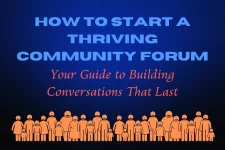But before you dive in, let’s break down what it takes to get a forum off the ground, from laying the groundwork to nurturing your community into something that thrives.
Setting the Foundation: What’s Your Forum About?
Every successful forum starts with a clear purpose. So, what’s yours? Is it about a specific hobby, like gaming or photography, or maybe something more professional like business networking? It’s important to narrow down your focus, especially when starting out. A general forum without a strong theme or focus can be hard to sustain early on, so make sure you’re clear about the community you want to create.
Once you’ve got that locked in, start thinking about the kind of conversations you want to host. Who do you want to attract? Defining your purpose upfront will help guide all the decisions you make down the road, from the forum's layout to how you engage with members.
Picking Your Platform: Choosing the Right Forum Software
Now that you know what your forum’s about, it’s time to choose the platform that will bring it to life. There are several options out there, each offering something a little different depending on your needs and experience. If you’re just starting out, you might want something user-friendly but still powerful enough to grow with your community.For example, platforms like XenForo and MyBB are popular choices because they strike a good balance between being customizable and easy to manage. If you’re tech-savvy or willing to put in a bit of learning time, you'll find these platforms flexible enough to handle just about anything you throw at them. On the other hand, if you prefer something straightforward with fewer technical demands, consider simpler alternatives that get you up and running without a steep learning curve.
Structuring Your Forum: Categories and Conversations
Next up, you’ll want to structure your forum in a way that encourages engagement without overwhelming newcomers. Start with a few key categories—just enough to organize the conversation but not so many that it feels empty. As the community grows, you can always add more sections to accommodate new topics and interests.For example, if you’re creating a forum for gamers, you might have a main section for game discussions, a spot for strategies and guides, and maybe a general chat area for off-topic conversations. The idea is to make it easy for people to jump in and find where they belong, whether they want to dive deep into a niche discussion or just hang out casually.
Setting the Rules: Creating Forum Guidelines
Now comes the less exciting but essential part—establishing the rules. Every good community has boundaries, and your forum will need them too. Think of these as the foundation for a healthy and welcoming space. Your guidelines don’t need to be strict or long-winded, but they should cover the basics: how members should treat one another, what’s acceptable content, and how you plan to handle disruptive behavior.Being consistent in enforcing these rules will help you maintain a respectful, open atmosphere where people feel comfortable engaging. It’s a good idea to pin these rules somewhere prominent on the forum so everyone knows what’s expected from the start.
Once your forum is live, it’s time to spread the word. Getting those first few members is probably one of the toughest parts, but don’t get discouraged—it takes time. Start by promoting your forum in places where potential members are likely to hang out. Are there social media groups or other online communities that align with your forum’s theme? Engage there, share your forum, and invite people to join the conversation.
You can also optimize your forum for search engines by making sure your titles and descriptions are clear and relevant to the kinds of discussions you want to attract. This will help people find you naturally over time.
Keep the Energy Going: Building Conversations and Engagement
Here’s where the real fun begins—growing your forum from a few posts into an active, engaged community. In the early days, it’s important to be hands-on. Start discussions yourself, ask questions, and encourage members to introduce themselves. If the conversation slows down, jump in and keep things moving.
Hosting events like Q&A sessions, running contests, or introducing fun topics can be great ways to keep people engaged. But remember, it’s not about constantly pushing activity; it’s about creating a space where members feel comfortable and excited to contribute.
Nurturing Your Community: The Core Group Effect
Over time, you’ll start to notice a few members who stick around, posting regularly and helping new users feel at home. This is your core group—those early adopters who will help define the culture of your forum. Encourage these members by giving them a little extra attention, whether that’s through shoutouts or special titles.Your core group will help sustain conversations and foster the sense of community that makes forums such a great place for interaction. The stronger this group, the more your forum will grow organically, as people start to feel like they’re part of something bigger.
Stay Flexible: Adapting to Growth and Change
As your community grows, be ready to adapt. What works for 10 members might not work for 100. Listen to feedback, experiment with new ideas, and evolve your forum’s structure or content as needed. Maybe that means introducing new features or sections, or simply tweaking how things are organized to better suit your expanding community.Above all, keep in mind that building a thriving forum takes time. It’s a marathon, not a sprint, but with patience, dedication, and a little bit of strategy, you’ll soon find yourself hosting a buzzing community full of lively conversations and passionate members. After all, wouldn’t it be boring if we all agreed?
